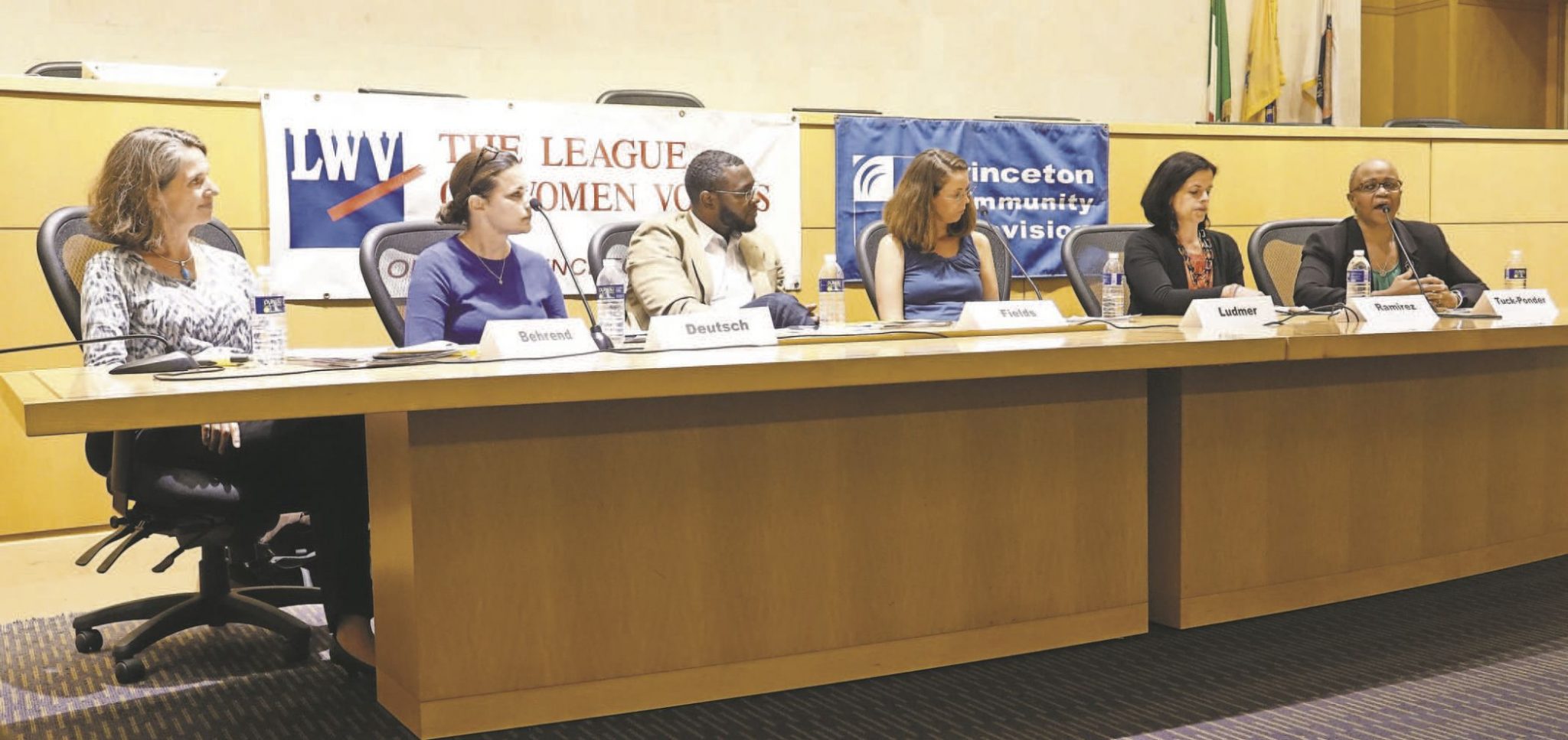By Philip Sean Curran, Staff Writer
Racial issues, the well being of students and the future of the district emerged as some of the themes of the first candidates forum the six Princeton school board candidates had Monday, the first of two such events they will have in the span of seven days.
For around 90 minutes in the Witherspoon Hall municipal building, Beth Behrend, Jess Deutsch, James Fields, Jenny Ludmer, Julie Ramirez and Michele Tuck-Ponder sought to win over voters with the election 37 days away. Three open seats on the school board are on the Nov. 7 ballot, with the winners taking office next year at a time when the district will have been in the midst of planning a facilities bond referendum for September 2018.
“We are looking at overcrowding in all of our facilities and we have to think about what we want to look like going forward,” Behrend said in making the case for long-term planning. “What kind of buildings do we need, what will education look like for the next twenty years?”
Ludmer picked up on that theme by pointing to how enrollment has grown 10 percent in recent years.
“Right now, we are at capacity or exceeding capacity at the high school, the middle school and in a couple of our elementary schools,” she said. “So we’re definitely at a point where we need to build consensus with the community and find solutions that meet the needs of the taxpayers as well as our students. That will be a tricky thing.”
Yet the candidates seemed unfamiliar with where the district already is in its thinking; officials are eyeing an addition to the high school, improvements to other school buildings and the possible construction of a new school for fifth-graders and sixth-graders. By the time the three winners join the board in January, the district will be three months away from having to submit plans for the referendum to the state Department of Education for approval.
At a time of rising enrollment, Ramirez said she did not have an answer when asked how she would deal with it.
“But what I would do, to make sure we come up with a solution that’s best for the town and best for our students, is we leverage the expertise we have in the town and get as much input as we can from the community to come up with the best solution that meets the needs of the schools and doesn’t cause an undue burden on the taxpayers,” she said.
Aside from bricks and mortar, the candidates also pointed to concerns about how students are doing, with high schoolers reporting they don’t get enough sleep and have hours of homework each night.
Deutsch said students need to “recover” once they get home after putting in “a full work day at school.”
Fields, a ministry director at Princeton University, said student well being and mental health was a concern of his. He said he was glad to see the district moving toward pushing back the start time at the high school.
“I think that’s a beginning of what we need to do,” he said.
Ramirez pointed to the challenge of easing the pressure on students, on the one hand, but maintaining the “excellence” of the schools on the other.
Race was another theme Monday. Tucker-Ponder, a former mayor of Princeton, who is black, said the district has “structural inadequacies” that contribute to “racial disparities … in discipline, the fact that our administration is not diverse, the fact that our faculty throughout our schools is not diverse and not reflective of the children and the population in our town.”
Ponder’s daughter, Jamaica, had been suspended at Princeton High School, where she was a student in the past school year, over her photo collage, in the school yearbook, that included the n-word.
“I think we need to have some fundamental changes in our curriculum, in our faculty, and we need to make the schools look different so people feel welcome,” Behrend said.
The faculty of the school district is about 85 percent white, with Deutsch saying the district needed to have teachers and administrators “who reflect the diversity of our community.”
“I really believe that we can find, as a community, that our diversity is our strength,” she said.
The school system has sought to move in that direction, including having administrators visit career fairs at historically black colleges, something that happened last week at Hampton University.
“We need to have people from different backgrounds in key leadership positions, be it in administration, be it in teachers, be it in staff,” said Fields, who is black. “Our students of color, students who are unrepresented, need to see people who look like them in key places, to be able to speak for them.”
For Tuck-Ponder, she is making a political comeback. She left municipal government, but she decided to run for the school board. She said she has a “steep learning curve” in how “education works.”
“And one of the challenges, I think, of being a member of the board of education is to remember that you are a policy-maker,” she said. “So the thing I would say as a board member is we need to listen to people, we need to offer input, we need to offer guidance to those who are on the ground and have to do the work. But I’m a little concerned about getting in the weeds on, specifically, how much homework people should have and what time school should start.”
Monday’s forum drew a crowd that included current and former school board members, Mayor Liz Lempert and Councilman Tim Quinn, a past school board president. The six candidates get to do it again Sunday at a forum starting at 7 p.m. at the Unitarian Church.

